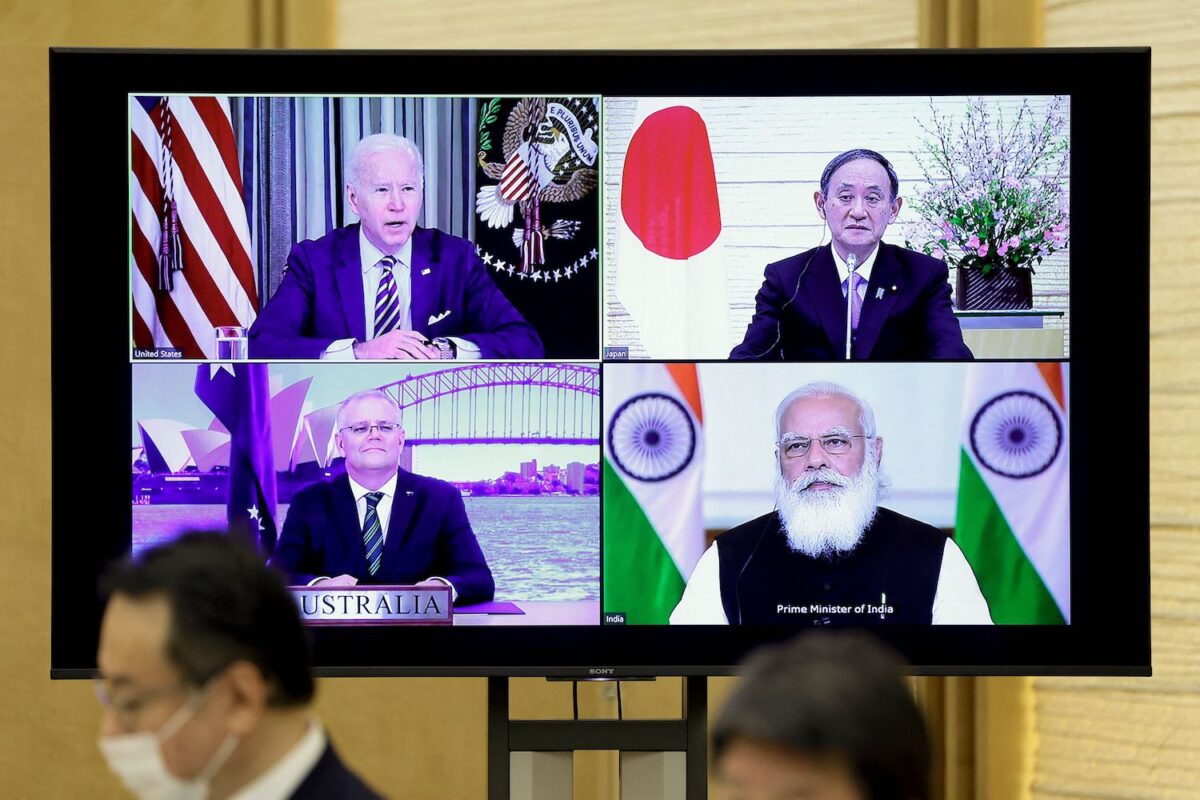China is opposed to the Quad security dialogue because it creates “discord” among countries of the Asia-Pacific region, a Chinese Foreign Ministry spokesperson has announced.
Speaking to reporters Monday and commenting on the meeting of Quad leaders hosted by US President Joe Biden on Friday, spokesewoman Hua Chunying accused ‘some states’ of exaggerating the danger supposedly posed by China.
“We drew attention to the quadripartite dialogue between Australia, India, the United States and Japan at the highest level, and are strongly opposed to these individual countries causing discord in China’s relations with the states of the region,” Hua said, speaking to reporters.
At Friday’s meeting, Biden told reporters that the Quad represents four “democratic partners who share a world view and have a common vision for the future”.
Australian Prime Minister Scott Morrison described that vision as encompassing “a region that we wish to be always free from coercion, where the sovereign rights of all nations are respected and where disputes are settled peacefully and [in] accordance with international law”.
Chinese media slammed the meeting, with an editorial in the Global Times warning that if the three countries following the US strategy of “containing China” “go too far”, they “will become cannon fodder as China will resolutely safeguard its interests”.
For his part, Chinese Foreign Ministry spokesman Zhao Lijian noted that any “closed” and “exclusive clique” of nations targeting other countries in Asia would be “doomed to fail”, and stressed that Beijing was interested in “solidarity and cooperation”, not conflict, among regional countries.
Last week, speaking before the United Nations General Assembly, Chinese leader Xi Jinping reiterated that China would “never invade or bully others, or seek hegemony”, and called for other countries to join China in promoting “win-win cooperation in conducting international relations” instead of “forming small circles” or thinking in terms of “zero-sum games”.
The Quad is one of over half-a-dozen bilateral and regional alliances formed by the United States to take on and try to hem in China. Earlier this month, Washington’s relations with its French allies took a hit after the US, the UK and Australia secretly created yet another security pact known as AUKUS without informing anyone.
The status of Taiwan and the South China Sea are two of the major hotspots driving tensions between Beijing on one side and the US and its allies on the other. The People’s Republic has repeatedly slammed Washington over its meddling in Taiwanese affairs, and considers the island an integral part of China destined for eventual peaceful reunification.
In the South China Sea, China lays claim to wide swathes of the strategic and resource-rich maritime territory, with other countries, including Vietnam, Malaysia, Brunei and the Philippines contesting these claims. The US, which is not a party to the territorial dispute, has nevertheless expressed its support to claimants other than China, and regularly sails warships through the region. Beijing, which established a regional dialogue for settling the territorial disputes in the early 2000s, has asked the US to mind its own business and to keep its fleet out of Chinese waters.
China has castigated the construction of nuclear submarines by non-nuclear weapon states as a violation of the non-proliferation regime, China’s UN Ambassador Zhang Jun told a session of the UN Security Council on Monday.
“China objects to [the] utilitarian approach to the non-proliferation treaty or the application of the double standards there to. <…> assisting non-nuclear weapons states in building nuclear submarines not only will intensify the arms race to the detriment of international non-proliferation regime as well as international and regional security and stability,” China’s permanent representative said.
“It also runs counter to the spirit of the NPT,” the diplomat stressed. The Chinese government “has scrupulously upheld the moratorium and has never waived in its support for [the] Treaty at the political level,” the ambassador added.
